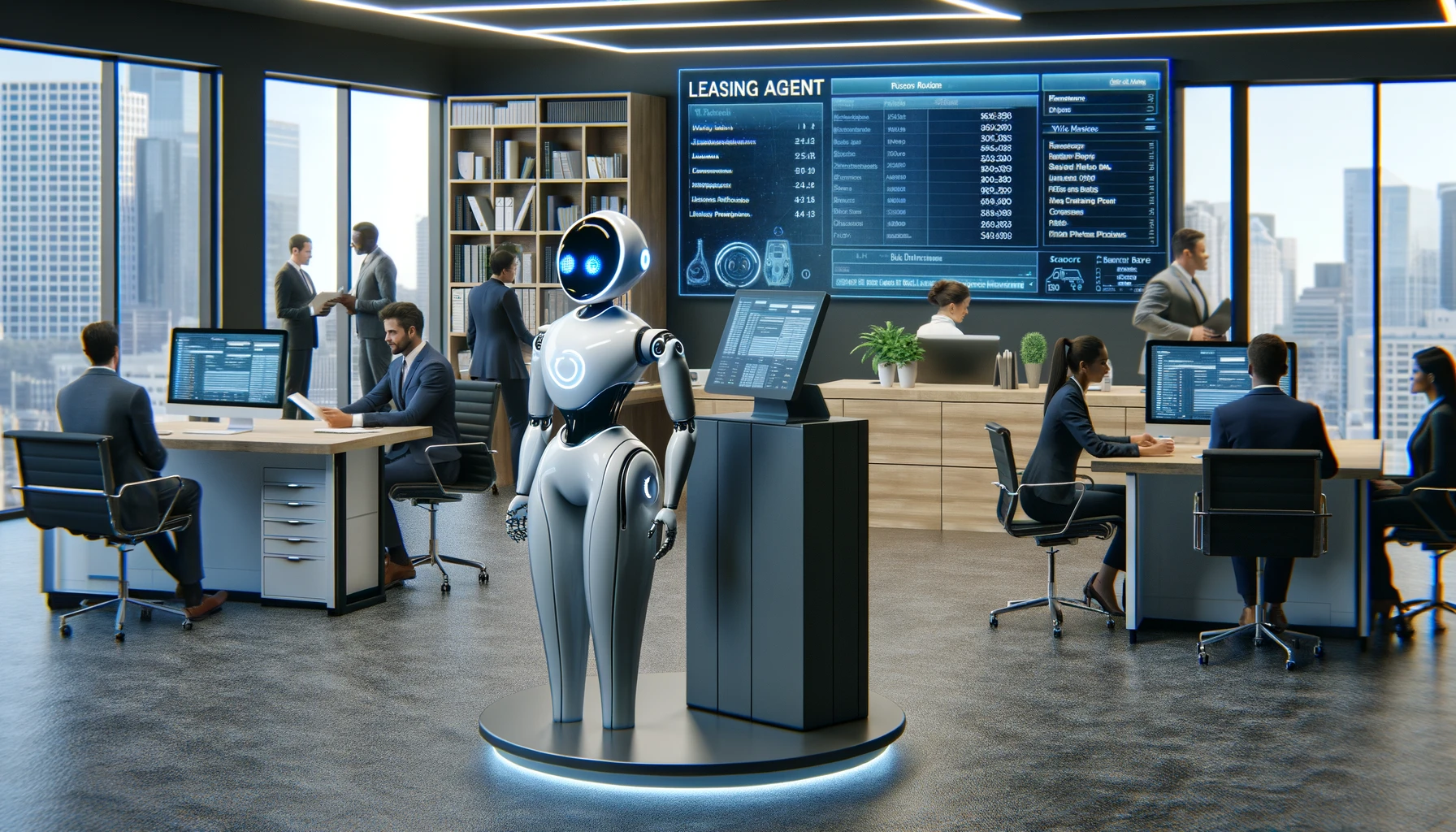Ever wondered how the future of property management looks? Well, it’s already knocking at our doors with the advent of the AI leasing agent.
This innovative technology is not just a buzzword; it’s revolutionizing the way properties are leased, managed, and experienced by both managers and tenants alike.
In this blog post, we’ll dive deep into the impact of AI leasing agents on property management, explore the efficiency they bring, tackle the challenges they face, and peek into future predictions and expectations.
Table of Contents
- Key Takeaways
- The Impact of AI Leasing Agents on Property Management
- Efficiency and Workload Reduction
- Challenges and Solutions
- Strategic Investment and Industry Redefinition
- Technological Advancements
- Comparative Analysis and Industry Insights
- Traditional vs. AI-Enhanced Property Management
- Wrap Up
Key Takeaways
- AI leasing agents revolutionize property management by optimizing the leasing process and seamlessly integrating with existing software.
- These agents reduce the workload on human agents by automating responses, scheduling property tours, and following up with leads.
- AI leasing agents provide a more human-like interaction, answering complex questions naturally.
- They offer 24/7 service, automate repetitive tasks, and provide personalized interactions based on machine learning and natural language processing.
- AI leasing agents are a strategic investment for the future, expected to redefine customer service and position real estate professionals for success in a digital world.
The Impact of AI Leasing Agents on Property Management
The introduction of AI leasing agents has significantly altered the landscape of property management. These digital marvels streamline the leasing process, making it more efficient and less time-consuming for property managers.
Efficiency and Workload Reduction
The cornerstone of AI leasing agents lies in their unparalleled ability to enhance efficiency and significantly reduce workload for property management teams. By automating routine tasks, these AI-powered assistants ensure that human agents can direct their focus towards more strategic activities.
For instance, AI leasing agents can handle a myriad of inquiries simultaneously, something a human team could never achieve alone. This automation extends to scheduling property tours and managing follow-ups, tasks that traditionally consume a substantial portion of a leasing agent’s day.
Moreover, the integration of AI leasing agents with property management software smooths out operational workflows. This synergy not only streamlines processes but also minimizes the chances of human error, further boosting overall efficiency.
In essence, the workload reduction facilitated by AI leasing agents is a game-changer. It allows property management teams to optimize their operations and focus on providing an exceptional tenant experience.
Challenges and Solutions
Integrating AI leasing agents into property management isn’t without its hiccups. One significant challenge is the initial resistance from staff, who may fear job displacement or struggle with adapting to new technology.
To overcome this, education and training are crucial. It’s essential to demonstrate how AI can be a partner rather than a replacement, freeing staff to focus on more complex, rewarding tasks.
Another hurdle is ensuring the AI system’s ability to understand and process the nuances of human communication. Misinterpretations can lead to frustration for potential tenants.
Solutions include ongoing machine learning and incorporating feedback mechanisms to continually refine the AI’s communication skills.
By addressing these challenges with thoughtful strategies, property management teams can unlock the full potential of AI leasing agents, paving the way for a more efficient, tenant-friendly future.
Strategic Investment and Industry Redefinition
Investing in AI leasing agents isn’t just about keeping up with technology; it’s a strategic move that redefines the entire property management industry. By allocating resources to AI, companies signal their commitment to innovation and efficiency. This investment is crucial for staying competitive in a rapidly evolving market.
The integration of AI into property management goes beyond mere automation. It represents a shift towards data-driven decision-making and personalized tenant experiences. As AI technology matures, its ability to analyze trends and predict tenant preferences will become a cornerstone of strategic planning.
For property management firms, the decision to invest in AI is a step toward redefining the sector’s future. It’s about embracing a tool that not only enhances operational efficiency but also reshapes how properties are marketed and managed. Firms that recognize this potential stand at the forefront of the industry’s transformation.
By leveraging AI, the property management industry is poised for a significant evolution. The focus shifts from traditional, manual processes to innovative, technology-driven solutions. This transition not only improves the tenant experience but also sets a new standard for the industry at large.
Technological Advancements
The realm of AI leasing agents is witnessing a surge in technological advancements that are reshaping the property management industry. These innovations are focused on enhancing the efficiency and effectiveness of leasing processes, offering unprecedented convenience and precision.
One key breakthrough is the integration of natural language processing (NLP) and machine learning. This allows AI leasing agents to understand and respond to complex inquiries with a level of sophistication previously unseen.
Another notable advancement is the predictive analytics capability. AI leasing agents can now analyze vast amounts of data to predict potential tenant preferences and behaviors.
This insight enables property managers to tailor their offerings and interactions to meet the unique needs of each prospect, enhancing the likelihood of closing leases.
By harnessing these technological advancements, AI leasing agents are not just transforming; they are revolutionizing the way properties are marketed and managed.
Comparative Analysis and Industry Insights
When we delve into the Comparative Analysis between traditional property management methods and the innovative use of AI leasing agents, a stark contrast emerges in efficiency and tenant satisfaction.
Traditional methods often rely heavily on manual labor, which can lead to delays and a less personalized experience for potential tenants.
On the other hand, AI leasing agents, such as those developed by MeetElise, offer a 24/7 service that traditional methods simply can’t match. They automate repetitive tasks like scheduling tours and answering FAQs, allowing human agents to focus on more complex inquiries.
This automation leads to faster response times and a more personalized interaction, thanks to the AI’s ability to learn from past interactions. Efficiency becomes the keyword when comparing these two approaches, with AI significantly outpacing traditional methods in both speed and accuracy.
AI leasing agents provide valuable insights and data that can help property managers make informed decisions, a feature that traditional methods lack. This data-driven approach not only enhances the tenant experience but also optimizes operational workflows, setting a new benchmark in the property management industry.
Traditional vs. AI-Enhanced Property Management
In the realm of property management, traditional methods have long relied on manual processes and human interaction for tasks ranging from tenant inquiries to lease management. This approach, while familiar, often leads to inefficiencies and delays that can hamper tenant satisfaction and operational productivity.
On the flip side, AI-enhanced property management introduces a paradigm shift. By leveraging technologies like machine learning and natural language processing, AI leasing agents such as those developed by MeetElise automate and streamline processes that were once labor-intensive.
This not only boosts efficiency but also elevates the tenant experience by providing instant, round-the-clock service.
Traditional methods are characterized by:
- Manual scheduling and follow-ups.
- Slower response times to tenant inquiries.
AI-enhanced approaches offer:
- Automated scheduling and communication.
- Immediate responses, regardless of the time of day.
The transition from traditional to AI-enhanced systems marks a significant leap towards optimizing property management operations, ensuring that both tenants and managers benefit from a more streamlined and effective service model.
Wrap Up
The AI leasing agent represents a monumental shift in property management, enhancing efficiency, reducing workload, and reshaping tenant experiences.
These digital assistants not only streamline operations but also set a new standard for customer service in real estate. As we look towards a future where AI integration becomes the norm, embracing this technology is not just an option; it’s a strategic imperative for staying competitive.
Dive into the future today and witness the transformation of your property management endeavors.


